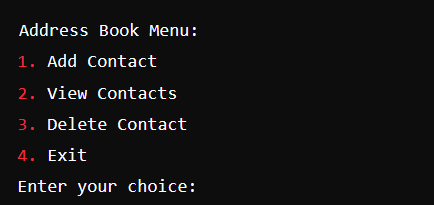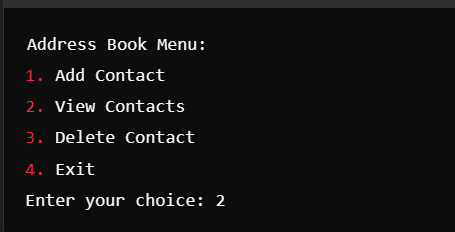Simple Address Book in Java
Creating an address book application is a fantastic project for beginner Java developers. It introduces core programming concepts like data structures, user input handling, and file I/O. In this blog post, we’ll walk through building a simple address book application that allows users to add, view, and delete contacts.
Project Overview
Our address book will consist of the following features:
- Add a new contact:A name, phone number, and email can be entered by users.
- View contacts: Users can see all the contacts stored in the address book.
- Delete a contact: Users can remove a contact by specifying the name.
- Save and load contacts: The application will save contacts to a file and load them when started.
Download New Real Time Projects :-Click here
Setting Up the Project
- Create a new Java project: Any IDE, such as Eclipse or IntelliJ IDEA, or even a basic text editor, will do.
- Create a new Java class named
AddressBook.
https://updategadh.com/category/php-project
AddressBook Class Implementation
Here’s a simple implementation of the AddressBook class:
import java.io.*;
import java.util.*;
class Contact {
String name;
String phone;
String email;
Contact(String name, String phone, String email) {
this.name = name;
this.phone = phone;
this.email = email;
}
@Override
public String toString() {
return "Name: " + name + ", Phone: " + phone + ", Email: " + email;
}
}
public class AddressBook {
private List<Contact> contacts;
private static final String FILE_NAME = "contacts.txt";
public AddressBook() {
contacts = new ArrayList<>();
loadContacts();
}
public void addContact(String name, String phone, String email) {
contacts.add(new Contact(name, phone, email));
saveContacts();
}
public void viewContacts() {
if (contacts.isEmpty()) {
System.out.println("No contacts found.");
return;
}
for (Contact contact : contacts) {
System.out.println(contact);
}
}
public void deleteContact(String name) {
Iterator<Contact> iterator = contacts.iterator();
boolean found = false;
while (iterator.hasNext()) {
Contact contact = iterator.next();
if (contact.name.equalsIgnoreCase(name)) {
iterator.remove();
found = true;
break;
}
}
if (found) {
saveContacts();
System.out.println("Contact deleted: " + name);
} else {
System.out.println("Contact not found: " + name);
}
}
private void saveContacts() {
try (BufferedWriter writer = new BufferedWriter(new FileWriter(FILE_NAME))) {
for (Contact contact : contacts) {
writer.write(contact.name + "," + contact.phone + "," + contact.email);
writer.newLine();
}
} catch (IOException e) {
System.out.println("Error saving contacts: " + e.getMessage());
}
}
private void loadContacts() {
try (BufferedReader reader = new BufferedReader(new FileReader(FILE_NAME))) {
String line;
while ((line = reader.readLine()) != null) {
String[] parts = line.split(",");
if (parts.length == 3) {
contacts.add(new Contact(parts[0], parts[1], parts[2]));
}
}
} catch (IOException e) {
System.out.println("Error loading contacts: " + e.getMessage());
}
}
public static void main(String[] args) {
AddressBook addressBook = new AddressBook();
Scanner scanner = new Scanner(System.in);
String choice;
do {
System.out.println("\nAddress Book Menu:");
System.out.println("1. Add Contact");
System.out.println("2. View Contacts");
System.out.println("3. Delete Contact");
System.out.println("4. Exit");
System.out.print("Enter your choice: ");
choice = scanner.nextLine();
switch (choice) {
case "1":
System.out.print("Enter name: ");
String name = scanner.nextLine();
System.out.print("Enter phone: ");
String phone = scanner.nextLine();
System.out.print("Enter email: ");
String email = scanner.nextLine();
addressBook.addContact(name, phone, email);
break;
case "2":
addressBook.viewContacts();
break;
case "3":
System.out.print("Enter name to delete: ");
String deleteName = scanner.nextLine();
addressBook.deleteContact(deleteName);
break;
case "4":
System.out.println("Exiting...");
break;
default:
System.out.println("Invalid choice. Please try again.");
}
} while (!choice.equals("4"));
scanner.close();
}
}






Explanation of the Code
- Contact Class: This class holds the details of a contact—name, phone number, and email.
- AddressBook Class:
- List of Contacts: It maintains a list of
Contactobjects. - Methods:
addContact(): Adds a new contact and saves the updated list.viewContacts(): Displays all contacts.deleteContact(): Removes a contact and updates the file.saveContacts(): Saves contacts to a text file.loadContacts(): Loads contacts from the text file at startup.
- Main Method: Gives users the ability to interact with the address book using a straightforward command-line interface.
Running the Program
To run the program, compile the Java file and execute the main method. Follow the prompts to add, view, or delete contacts.
Post Views: 571
